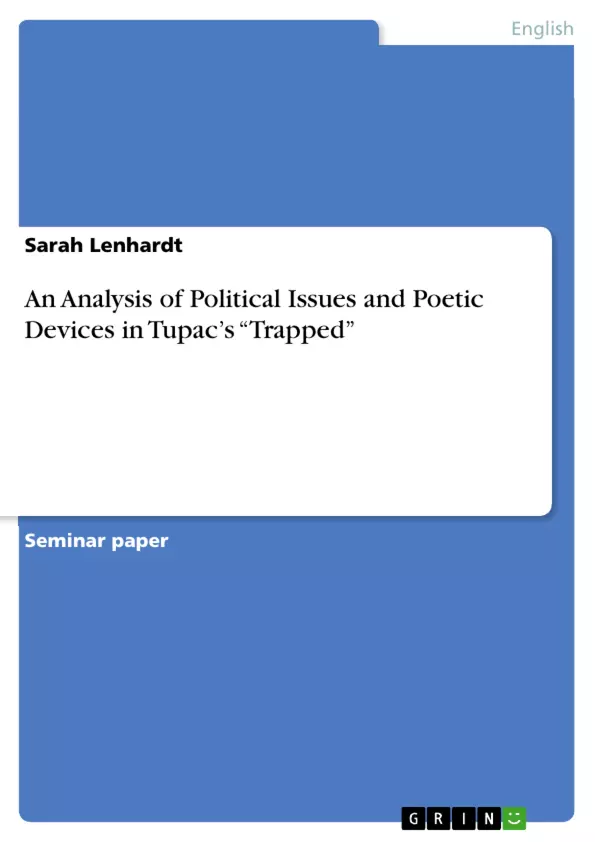Conventionally, rap music is not associated with poetry at all. Over the years, rap music has received fierce criticism because it usually contains colloquial and vulgar expressions and is therefore negatively connotated. Brent Wood adds that “[the] reasons for this lack of attention include cultural differences between Euro-American and African-American sensibilities, the reluctance of academic poets and critics to embrace popular culture, and the inability of print-based analysis to deal adequately with oral artistry” (129). However, a closer look will reveal that the use of poetic devices and the questioning of political issues makes rap music poetically valuable. The objective of this paper is to show rap music as poetry and not only as popular culture.
Tupac Shakur’s song “Trapped” was published in 1991 and deals with the inequality and oppression of black people living in urban areas (see Prier 89). Tupac Shakur is considered one of the most popular and successful rappers in the 1990s. He is famous for the political and social issues in his songs, as in “Changes”, “Keep Your Head Up” and in “Trapped”. In these songs, themes such as racism, police brutality, poverty, the struggle of being a single mother, hopelessness, and the constant fear of getting imprisoned are portrayed.
Since my first focus is on poetry, poetic devices will be examined that prove rap music can be poetry. But I am also going to look for political issues represented in the song that are still relevant today. The Black-Lives-Matter movement against the ongoing police brutality and systematic racism against members of the black community has a strong social impact in the United States. The only thing that has changed regarding the US prison system is the drastic increase of prisoners in the last decades.
The second focus of this term paper will pursue the question, How are 1990s political issues in the US in the represented in “Trapped”? In order to get a better understanding of what “Trapped” is about, I will do research on police brutality and systematic racism as well as the prison system in the United States.
Table of Contents
- Lyrics of "Trapped"
- Introduction
- Analysis
- Formal Analysis
- Stylistic Analysis
- The Use of African American Vernacular English
- Political Issues in "Trapped"
- Systematic Racism and Police Brutality
- The US Prison System
- Conclusion
- Bibliography
Objectives and Key Themes
This paper aims to demonstrate that rap music can be considered poetry, highlighting the use of poetic devices and the examination of political issues within the context of Tupac Shakur's "Trapped." The analysis focuses on how the song reflects the social and political realities of the 1990s, specifically the experiences of Black people in urban areas.
- The poetic nature of rap music
- The portrayal of systemic racism and police brutality
- The impact of the US prison system on Black communities
- The social and political context of the 1990s
- The use of poetic devices in "Trapped"
Chapter Summaries
The introduction establishes the often-overlooked poetic value of rap music, specifically highlighting Tupac Shakur's "Trapped" as a prime example. It introduces the song's context, focusing on the inequality and oppression faced by Black people in urban areas.
The "Analysis" chapter delves into the formal and stylistic aspects of "Trapped," examining its structure, rhyme scheme, and use of poetic devices. The chapter highlights the use of metaphors, metonymy, and ellipsis to convey the themes of oppression, seclusion, and the harsh realities of street life.
The "Political Issues in "Trapped"" section examines the social and political issues reflected in the song, particularly the ongoing issues of systemic racism, police brutality, and the US prison system. This section explores the historical context of these issues and their enduring relevance today.
Keywords
The main keywords and focus topics of the text include: rap music, poetry, Tupac Shakur, "Trapped," systemic racism, police brutality, US prison system, Black Lives Matter, social inequality, urban areas, poetic devices, African American Vernacular English.
- Quote paper
- Sarah Lenhardt (Author), 2021, An Analysis of Political Issues and Poetic Devices in Tupac’s “Trapped”, Munich, GRIN Verlag, https://www.grin.com/document/1417947



